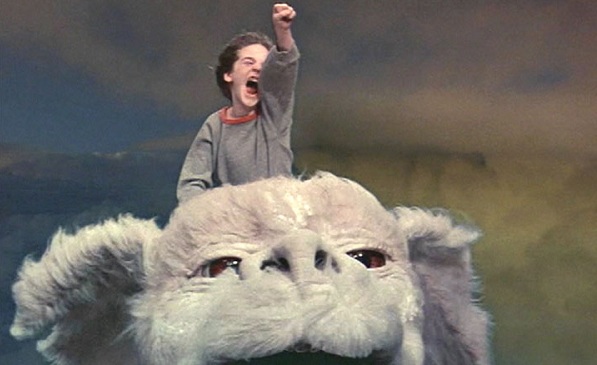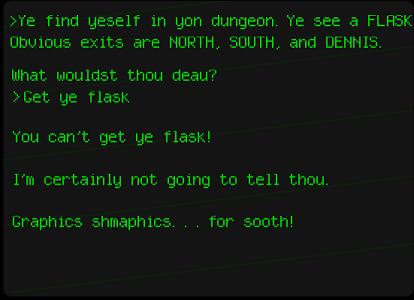Your login information returned multiple users. Please select the user you would like to log in as and re-type in your password.

With the Zork series being on sale this past weekend over at GOG.com, I’ve been flashing back to the days before liberal use of graphics. Some of these titles relied entirely upon text to convey an experience to the players and one of our biggest tools was our imagination. Graphics were expensive and sound cards were few and far between. Now that I’ve poured myself a glass of port and put on a smoking jacket, pull up a chair sonny and I’ll tell you how it used to be.
A lot games from the 80 and 90s used text to tell a story and describe the game. Not unlike a novel, it was up to the player to imagine the environment, monsters and equipment that were present in the world. Obviously people didn’t sit around going “Hmmm, now I wonder what this looks like”, all of this was done subconsciously. Of course, the more textual the game was, the more you had to fill in with your mind. With the addition of next-gen graphics and technological advances that have been made in motion capture and realistic animations, there are not many things that are left to the imagination. While developers have gotten more control over the player’s experience in the game, the players in turn have lost their ability to create their own version of the world.

For those of you I lost in the second paragraph, Zork was one of the first text based adventures and was the inspiration for MUDs (Multi-User Dimensions/Dungeons). As some of you may recall, Brad has a soft spot in his heart for a particular MUD by the name of Chaos Blade. Aside from the strong social aspects of the game, one of the most compelling components was the use of imagination. Since everything was text based, you could do anything in the game; if you could imagine it, you could do it. You were not restricted by what the developers had animated or had assets for, nor did the game engine hinder your creativity. With such freedom, it was very easy for people to create incredibly revolutionary experiences.
Has the use of imagination completely fled from the modern gaming experience? I wouldn’t say so. There are many ways to force players to use their imagination and one of the simplest methods is omission. Good horror games excel at this by allowing the player’s imagination to create something far scarier than anything the developer could have ever modeled. By omitting information or by not showing something, the player’s imagination can run wild attempting to fill in those gaps. However, once you are shown the horrible monster you’re supposed to be afraid of, it can fail miserably; like getting the full monty and laughing at the tiny shriveled mess that was presented to you.
I do believe that the player’s imagination is underutilized in a lot of modern games. Using text to do so is very difficult these days without coming off as low budget or an intimidating wall of text. Text was a tool that we used for a lack of better implements, but now we have narration, superb sound effect and stunning graphics and used appropriately, these tools can add to the experience.
Picture a scene where you track a beast into it’s lair intending on killing it. You see it’s tracks leading into the cave and guiding you along narrow passage ways, however, you also find larger sets of tracks. Using cues from the environment you realize that you have stumbled upon something more formidable. The foot prints, the glistening cave walls with deep gouges in them and even a glimpse of a shadow can help paint an image of a terrifying creature in your mind without ever outright showing it to you.
There are many other games that make use of imagination which may not seem to do so at first glance. Puzzlers force you to think of creative solutions and lately there have been a number of creativity driven games such as Terraria and Minecraft that thrive on player imagination. Even RPG’s encourage players to creatively develop their character’s personality There are many games out there that allow player creativity to add to the experience. Should every game out there use this tool to augment the user experience? Probably not, though I can certainly think of some bland first person shooters that could have been improved by it.
What do you guys think? Are there any games that spring to mind which have really taxed your skills of imagination and left you with an invigorating experience? I would love to hear your thoughts so chime in by commenting!




Comments
14 years, 3 months ago
Dungeons and Dragons. We had a really good DM who had been using his own custom world for campaigns for many years, and had a VERY developed history for his world. It was awesome to explore the world, and find out things about it when it was so unlike anything I had ever experienced in a video game. Video games end, but this world went on forever. It's cool to know that what our characters did is forever imprinted on the pages of that worlds history. What we did really happened, and I will never forget it.
14 years, 3 months ago
This was a great read. Upon reading the title I had planned on writing a large question block asking if you believed there could be a place for this in modern gaming, but you seem to have covered that in subsequent paragraphs within. Personally I agree with you, video games could certainly gain more from allowing the player to bring their own experiences, be they from their everyday lives or from what they encounter within the game it self.
I think a good example of this in modern gaming would be Demon's Souls. Sure the game has a story that it tells you, but the atmosphere of that world really speaks to the player and imparts mood rarely seen in games today. Limbo manages to grasp the player completely without a word of written or spoken story save for the game description. Also Journey is coming down the pipe which is a game that relies completely on the world telling the narrative.
I do have a question I would like to ask though. Why do you think so many developers/designers shy away from vagueness? As you said most modern players see text based stories or large blocks of text in the game and assume that the budget was simply too low to afford voice actors and thus the rest of the game itself must be low budget (I realize that is a huge generalization). Conversely a game like Limbo contains minimal story that the player knows up front, and on several occasions the 4pp crew (particularly Nolan, I think) have expressed that even that was unnecessary.
So what do you believe that there is a place for a little leg room? Is it such a bad thing for players to draw their own opinions and use them to fill in the blanks? Is it fear of turning out a product that they may feel is incomplete? Or is it simply a feeling of if we follow the template we will get some sales?
14 years, 3 months ago
I believe with the tools provided in Little Big Planet 1 and 2, there is limitless amounts of imagination being brought to life.
14 years, 3 months ago
Good read! I'm pretty young so I didn't play MUDs back then, but I'm thinking of giving some a go.
I agree with Soulglove, the games which allow you to create such as Little Big Planet, Minecraft etc that depend upon our imagination are the best examples today.
There are games like The Elder Scrolls and Dragon Age series that give you codex which I think is really useful in rpg games like this where you really have to put yourself in that world, the story and those situations. Then again most people just skip reading it...
I think the 'leaving room for interpretation thing' is a great thing in games when used well. For example, *SPOILERS* in Silent Hill 3 when Vincent suggests that the monsters might not actually be monsters. That was CRAZY. In the Silent Hill fanbase there have been so many interpretations of what he could have possibly meant by: 'They look like monsters...to you?' This, in addition to personal interpretations of what the different monsters may represent to the characters, is such an interesting way of leaving the imagination to the player.
I would very much like to see more of this done in the future.
14 years, 3 months ago
By far my favorite games have always been open world sandboxes like the Civilization or Sim City series (not including that Societies PoS). Sim City is in fact the reason I have known since about 7 years old that I wanted to (and did) grow up to be a civil engineer. Many games spark off years of entertainment or cultural study etc, but few games help establish a life calling.
14 years, 3 months ago
I'm not in the mood to right a lengthy "I agree" comment.
so yeah...good article...
14 years, 3 months ago
This is very true, sometimes I want to see the characters in a game do certain things, but they don't. I ponder what would they do if certain situation sprung, but that's where it ends. I feel that this is a reason why certain games like ICO, Shadow of the Colossus, and Demon's Souls, (yea all involved JAPANStudio, leave me alone.. I love them T_T) excel well. They have really vague and empty stories, which some of it's own designers stated that they never saw and still dont see those works as pieces of art. But we do, we like what they did because we imagine and create these stories surrounding certain characters that we see often and we think about why they are in the world they are.
The best way to achieve that I believe is having a minor cast of characters, they dont have to say too much, but our mind will try to crack what is their raison d'être. That's why I like the Silent Hill series, a lot of it is made up stuff by the fans of it, thinking why things are the way they are. Great article, really made me think Oplock :D
14 years, 3 months ago
I remember Mario paint and how I loved the composer because I felt like I was making music even if it was a cover of a song.
14 years, 3 months ago
With all this talk of imagination, I just thought up of something. Would horror games do better if they didn't ever let you see what the monster/person that was chasing you look like? I would think that if the monsters in games where just given a voice and just a very hard to distinguish shape that you still can only see a shadow of, would things become even scarier? I for one would think so... good read you have there Bob.
14 years, 3 months ago
Only experience I've had with these was that one time in one of the Sam and Max episodes. Pretty cool, though.
14 years, 3 months ago
I think horror games with good atmosphere, like Silent Hill, are your best chance at getting to use your imagination in the modern era. Even if you end up seeing all the enemies eventually, there are a lot of points that foreshadow what's to come, and just the overall feel of the game makes you wonder what's coming next. To me, that's always a sign of a good game. It makes your imagination go wild when you wonder what you're going to fight next, because it's drawn you in so much that you're almost afraid of whatever awaits you.
Other than that, though, I don't think games need to tax your imagination so much. Sometimes, it's more interesting to know what the developers' imaginations are able to conjure. I know that if I were to make a game, I'd like to be able to say I brought players into a realm of my own imagination that they've never seen before.
14 years, 3 months ago
Imagination really is our mind's strongest tool, one that should be used more by games.
14 years, 3 months ago
Man text based games are fun, I should try one again.
14 years, 3 months ago
Being a youngster I seem to have missed out on a lot of these games but reading about this makes me hope to see games that make me use my imagination instead of doing it for me. I have absolutely loved your articles so far!
14 years, 3 months ago
I've never really played a text based game and i'm not really attracted to play one fully, i guess because i've been spoiled by games with graphics and audio. The best example i have in my mind of a game that sparked some fun for my imagination was NieR. The text sequences were a really enjoyable aspect of the game and its something that i remember whenever i think about NieR.
Keep up the awesome work Sir Bobington :p
14 years, 3 months ago
I used my imagination a lot when it came to the story behind Limbo. Partly because I wanted to make up a better story than the ones that I had been hearing on podcasts. In my version of Limbo, the children belonged to an organization called "The Parliament of Fear" and their mission was to destroy the mind of the limbo child. It made the game fun, but the ending needed like 3 more seconds to fully fit in with my made up story.